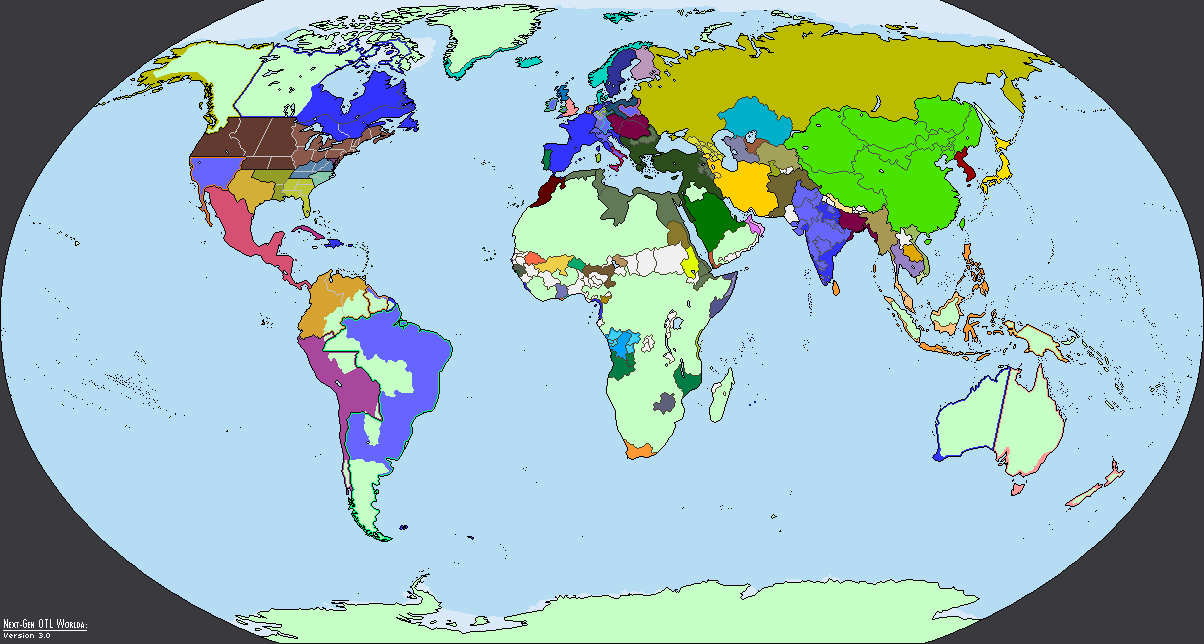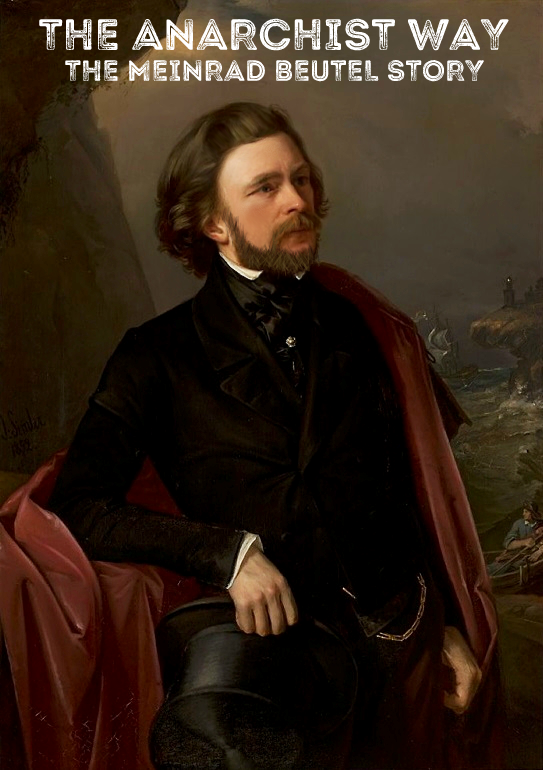Well, we got Louisiana back for the Americans, but it'll be interesting to see how this alliance between AH and France hold.
You are using an out of date browser. It may not display this or other websites correctly.
You should upgrade or use an alternative browser.
You should upgrade or use an alternative browser.
"What Madness Is This?" Volume I: The Union Forever
- Thread starter Napoleon53
- Start date
Threadmarks
View all 142 threadmarks
Reader mode
Reader mode
Recent threadmarks
THE 2019 MADNESSVERSE HOLIDAY SPECIAL: "IT'S PATRIOT-SAINTS DAY, ZAP ZEPHYR!" THE BIGGEST HOSTAGE OF ALL "THE WHOLE WORLD HEARS YOU!" OSWALD: AUTHOR OF HIS OWN DESTINY THE GREAT EUROPEAN SCHISM: RISE OF THE NEW HOLY ROMAN EMPIRE IN A "SAFE" PLACE THE SUMMER OF '37: THE OLD HOMESTEAD ROUNDERS: THE WORLD SPORTIt should be obvious that at some point, the RU will seek to take control of the rest of Louisiana from Georgia; I would not be surprised if the RU builds armored gunboats to challenge Georgia. The RU will have an advantage as they already control territory on the west side of the Mississippi River and can move troops overland while Georgia has to cross the river to reinforce.Union ambassadors led by Meriwether Lewis arrived to negotiate a "final peace in our time" over the Louisiana issue. In exchange for the Union entering the war against Mexico, they would receive almost the entirety of the Louisiana territory for the sum of 50 million RU Dollars. However, the southern half was to be sold to the Republic of Georgia, including the all-important New Orleans. The Union diplomats demanded this portion as well, but eventually agreed to the deal after France's price went down to 40 million dollars and guaranteed neutrality of the Mississippi River. America would quickly come to hate this deal, as the flow of America trade that was supposed to be free and guaranteed open travel was still restricted by the patrolling Georgian gunboats. This would later lead to many more problems. Even Georgia was now less pro-French, as they had seen the sale of Louisiana as a slight against their sovereignty and as bowing down to Philadelphia.
BTW will Georgia challenge Virginia for control of Cuba at some point? I would imagine Virginia will have problems holding on to Cuba....
Virginia left Cuba after the Virginia Carolinian War because of the instability at home.It should be obvious that at some point, the RU will seek to take control of the rest of Louisiana from Georgia; I would not be surprised if the RU builds armored gunboats to challenge Georgia. The RU will have an advantage as they already control territory on the west side of the Mississippi River and can move troops overland while Georgia has to cross the river to reinforce.
BTW will Georgia challenge Virginia for control of Cuba at some point? I would imagine Virginia will have problems holding on to Cuba....
Virginia left Cuba after the Virginia Carolinian War because of the instability at home.
Hear hear! We sure showed them Imperialist Virginians what's what!!
*Casually sweeps Carolinan imperialism under the rug*
Ah OK thanx....so Cuba is up for grabs.Virginia left Cuba after the Virginia Carolinian War because of the instability at home.
Darn, was looking forward to seeing an independent New Orleans but I guess Georgia is as good as any fate for them. 
Since we have an independent Austria-Hungry, will there be no Triparte Empire?
Since we have an independent Austria-Hungry, will there be no Triparte Empire?
Had Napo forgotten to put a bookmark in the 23rd?
I wonder how multicultural New Orleans will be, especially with all that RU traffic. It will essentially be the "Shanghai" to the Americans' "People's Republic" which the latter finds scandalous. And with that, I don't see the situation even in the 19th century be that good, what with the Yankees and Georgies maybe, just maybe rubbing shoulders with each other. All these are inevitable, I fear, unless Georgia actively discouraged Catholic and Slav immigration in the area.
I wonder how multicultural New Orleans will be, especially with all that RU traffic. It will essentially be the "Shanghai" to the Americans' "People's Republic" which the latter finds scandalous. And with that, I don't see the situation even in the 19th century be that good, what with the Yankees and Georgies maybe, just maybe rubbing shoulders with each other. All these are inevitable, I fear, unless Georgia actively discouraged Catholic and Slav immigration in the area.
Even with Georgia annoyed at France over Louisiana, I cannot imagine them discouraging Catholic Immigration; Georgia is not going to appease the RU.I wonder how multicultural New Orleans will be, especially with all that RU traffic. It will essentially be the "Shanghai" to the Americans' "People's Republic" which the latter finds scandalous. And with that, I don't see the situation even in the 19th century be that good, what with the Yankees and Georgies maybe, just maybe rubbing shoulders with each other. All these are inevitable, I fear, unless Georgia actively discouraged Catholic and Slav immigration in the area.
So with Virginia withdrawing from Cuba, what will likely happen there? I would think the Cubans will try to organize a government, but might need help. I'm thinking the Cubans reach out to Georgia with some sort of arrangement for protection.
I don't think Cuba would reach out to Georgia. Rather, I think Henry Clay's Trojan horse screwed them enough that they want to do their own thing for now. Even bitter poverty is better than getting randomly occupied by an "ally."
CHAPTER 24
CHAPTER 24
THE NEW WEST

Flag of the Kingdom of California
THE NEW WEST
Flag of the Kingdom of California
Upon the signing of the Louisiana Accords, the Republican Union began sending legions of troops out west to conquer the savage frontier and help destroy the Confederated Empire of Mexico, and it's Mad Emperor Iturbide. In late 1836, Yankee troops clashed with Mexicans for the first time, handing Iturbide's men a series of bloody defeats. They were ruthless and fresh and itching for war. American Fundamentalist Volunteer Brigades were pouring westward, just as they had during the Invasion of Vermont. Things were not looking good for the Mad Emperor. He had been waging constant warfare since 1827, when he had overthrown the Spanish overlords and went on a "campaign of liberation" of the other Central and South American regions.
Many said the war would have been ended years earlier, but Iturbide's former apprentice and rival Simon Bolivar of Gran Colombia had passed away in 1830, leading to a near-disintegration of Gran Colombia and civil unrest. Bolivar had fought with Iturbide in his campaigns of liberation throughout Latin America, but Bolivar was a staunch republican and hated monarchy, leading to the breakdown of their alliance and eventual war. In 1832, Gran Colombia entered a bloody period of three-way civil war between the forces of the Republican Army and Bolivarists against the Monarchists and Anarchists. With Gran Colombia out of the way, Iturbide finally ride himself of the nascent foe and was able to fuel his nearly suicidal war of attrition against the forces of North America.
But upon the American entrance to the war after the Louisiana Accords, the tide had turned. Not only were the Yankees marching down sacking and burning Mexican towns as they went and solidly defeating the Native Americans hired by Mexico as troops, but Napoleon II was also taking personal control of the Mexican War. Napoleon was determined to make his stand and defeat Iturbide once and for all. Rumors of weakness abounded after the Accords and the Second Treaty of Vienna, with some saying he lacked the "warrior spirit" and "combative bravery" of his father. Now he would make an example of Mexico for all the world to see. He would overthrow the Mad Emperor and send Mexico back to the Stone Age.
In early 1837, with the Austrian crisis well in the past, French reinforcements landed on the Mexican coast. 50,000 troops immediately set out for Mexico City and there they finally leveled its defenses. As the city flew into a panic, the people toppled Iturbide, who began a flight out of the country and abandoned his own throne. His top generals and staff were executed and a Mexican Republic was proclaimed.
Over the next year, borders were drawn and redrawn and treaties signed. In the end, the Union was allowed to annex the largely empty territory of Oregon, securing the Union a Pacific port in Barnumsburg*, Oregon's capital, that it had so long desired. It also gave it a thin but still noticeable border with Slavic Russian Alyaska, which they had not desired. As for the Louisiana Purchase regions, Montana was quickly first occupied by former convicts and petty criminals given a second shot at life on the frontier. Preaching American Fundamentalism and carrying a rifle, these men and women forged a new identity in Montana. Eventually, in 1840, it was officially admitted into the Union as the Territory of Redemption, and its capital was located in Aurora*. America carved out Dakota, with its capital in--of course--Praise. To the southwest was Lewisland and its capital in Salvation Springs*, and to the southeast along the mighty Mississippi was the Territory of Osage, and its capitol of Lewis City, formerly known as St. Louis under French and Spanish rule.
The only reason the Union was awarded Oregon was because they had to be browbeaten by Napoleon II into accepting the independence of the Kingdom of California. California was seen as vital by France, more vital than any other land in the west, and stories of gold in the hills and creeks of the vast territory had long been heard back in Europe. To ensure stability in California and to prevent it from becoming Louisiana part two, it was granted independence from Mexico and Princess Mathilde Laetitia Wilhelmine, the 20 year-old daughter of Jerome Bonaparte and Catharina of Wurttemburg, was installed as Queen Mathilde Laetitia I of California. Shortly after her coronation, she was married to Pierre Chevrolet, a wealthy Quebecois architect and land owner, and he became the Royal Consort of California.

Queen Mathilde Laetitia I of California

Count Charles de Morny
Meanwhile, in the section of Louisiana bequeathed to Georgia, the Southron nation created two territories out of it. The northern section became the Territory of Mississippi, with its capital in Fort Davis*, the southern section becoming Louisiana proper, with its capital in New Orleans. The namesake of Fort Davis was the 50 year-old Georgian General Joseph E. Davis, who had led the Georgian Army in Mexico for most of the Mexican War. Davis resented poor management of the war and actively campaigned in the 1840s for the deposing of President George Crawford (no relation to Willard) and the defeat of the Liberty Party which had been in power since Archibald Bulloch's successor, George Troup. The Patriot Party, largely consisting of angry veterans, anti-Union radicals, slavers, and the middle class, took power in 1841 under the control of President George Bonaparte Towns. Under his administration, he greatly heightened tensions with the Yankees and continually harassed Union shipping down the Mississippi River. Towns and the Patriot Party would lose power to the Log Cabin Party in 1849, after the end of Towns last term. President Herschel Vespasian Johnson would ease tensions along the Mississippi River and quiet tensions, but poor economic showings at home propelled Towns and the Patriots to once again seize power in the 1853 elections and reignite the threat of war with the Union.

George B. Towns
In 1840, Georgia also finally modernized its borders as Virginia had done and created "departments" within its own nation, much like states in the Union. These new departments made taxes and border control much, much easier. The new departments were Savannah, with its capital in Savannah proper, in the north was Peachtree, with its capital in Athens, out to the southwest along the coast was West Florida, with its capital in Mobile, and north of West Florida was Bulloch, and its capital of Elyton. Finally, at least on the mainland, was Florida, and its capital of St. Augustine. In the Caribbean, the Bahamas and the Cayman Islands were also granted department status, with their capitals in Nassau and George Town respectively.
Meanwhile, the Democratic-Republic of Texas had expanded in the aftermath of the Mexican War and became a buffer state between the Union and Mexico, as France feared the Union might one day try to invade Mexico again. France and her allies simply didn't have the time or energy to occupy all of Mexico forever, and so tried to guarantee its independence and neutrality. Texas was now a large nation but a very broke one, with the government teetering on the edge of bankruptcy constantly and the threat of a military coup was very real in the late 1830s. However, by 1840, thanks to Union shipping along the Mississippi, trade started to slowly bring back the economy. Georgia also guaranteed the Texas government troops in its never-ending war against the Indian tribes. Unfortunately, Texas would one day soon overstep themselves in their ambitions to achieve riches from tariffs, and their sock-puppet alliance with Georgia would involve them in a bloody, bloody war a generation later.
*Barnumsburg, Oregon, would be Portland, OTL
*Aurora, Redemption, would be known as Billings, Montana, OTL
*Salvation Springs, Lewisland, would be OTL Colorado Springs

MAP OF THE WORLD: 1840
Last edited:
What do you guys think this California's capital should be? I considered San Fransisco and Sonoma, but I'm honestly not sure.
What do you guys think this California's capital should be? I considered San Fransisco and Sonoma, but I'm honestly not sure.
San Francisco I think could be good. Or even Monterey.
Won’t California and Russian territory be infringed on by the union due to low population


Working on this baby right now.
AeroTheZealousOne
Monthly Donor
Working on this baby right now.We finally get some backstory for why anarchism is one of the most popular subversive ways of thinking.
Aw hell yeah, Napoleon!
Are there any OTL works this can be compared to while we speculate? Any theories and ideas developed by Beutel as to how an anarchist society would be implemented ITTL? I'm just hyped because of my... uh, sympathies, and depending on what kind of person Beutel is, he may be one of the closest things to a hero that we have in the Madness-verse. Except for, y'know, all the crackdowns and the implied paralleling to elements of George Orwell's most famous work that will soon develop in Europe. And that this figure does look a tad bit bourgeois...
That’s a big Georgia. I vote for Monterey being California’s capital. Is Barnumsberg a reference to PT Barnum or have I missed something?
What’s Custer been up to? Will the farshowed war be where our classic dictator makes himself know?
What’s Custer been up to? Will the farshowed war be where our classic dictator makes himself know?
That’s a big Georgia. I vote for Monterey being California’s capital. Is Barnumsberg a reference to PT Barnum or have I missed something?
What’s Custer been up to? Will the farshowed war be where our classic dictator makes himself know?
PT Barnum will indeed be making an appearance! He'll probably be crazy enough to get his own chapter.
I'm leaning on Monterey just for a fun factor since San Fransisco is just an obviously boring choice.
Custer will be coming up soon! I can't wait!
Aw hell yeah, Napoleon!
Are there any OTL works this can be compared to while we speculate? Any theories and ideas developed by Beutel as to how an anarchist society would be implemented ITTL? I'm just hyped because of my... uh, sympathies, and depending on what kind of person Beutel is, he may be one of the closest things to a hero that we have in the Madness-verse. Except for, y'know, all the crackdowns and the implied paralleling to elements of George Orwell's most famous work that will soon develop in Europe. And that this figure does look a tad bit bourgeois...
You'll just have to wait and see!
Last edited:
Threadmarks
View all 142 threadmarks
Reader mode
Reader mode
Recent threadmarks
THE 2019 MADNESSVERSE HOLIDAY SPECIAL: "IT'S PATRIOT-SAINTS DAY, ZAP ZEPHYR!" THE BIGGEST HOSTAGE OF ALL "THE WHOLE WORLD HEARS YOU!" OSWALD: AUTHOR OF HIS OWN DESTINY THE GREAT EUROPEAN SCHISM: RISE OF THE NEW HOLY ROMAN EMPIRE IN A "SAFE" PLACE THE SUMMER OF '37: THE OLD HOMESTEAD ROUNDERS: THE WORLD SPORT
Share: